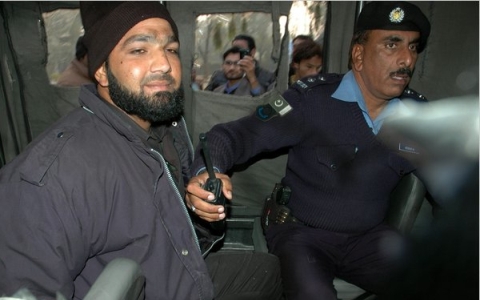ANALYSIS Now it’s official: Pakistan’s blasphemy law is ‘manmade’ - and promotes ‘religious vigilantism’
by - 20th April 2016

IT IS not known what prompted the chairman of the Council of Islamic Ideology (CII) publicly to announce a U-turn in the blasphemy law.
Maulana Mohammad Khan Sherani, announced in January that if formally requested by the government, the CII would be prepared to review the controversial law.
The move sounds intriguing as this law since its inception has been heavily wrapped up in politics in the name of religion.
This public statement ostensibly has been made against a background of continuing discussions about the abuse of the blasphemy law.
On numerous occasions neighborhoods have been burnt, people lynched alive, their houses and worship places burnt and destroyed.
It was vigilante justice each time, unleashed by a violent mob carried away by religious fervour to avenge the honour of the Prophet or of the Quran, thus acting as prosecutors, judges and executioners.
Yet the record bears out that this law has been abused for settling personal scores, professional rivalry, land grabbing and for religious persecution.
It is also true that all segments of society including the judiciary, political leadership and civil society and even the religious leaders themselves have acknowledged that abuse of this law has caused tremendous loss to society as a whole.
In the light of this discussion there has been constant pressure to revisit the law. But the religious extremists have always protested, exercising street power through their pupilage of madrassas (Islamic seminaries), and issuing threats of dire consequences and fatwas (religious decrees) against any move that would disturb the law as it exists.
Justice
The blasphemy law as presently constituted on the statute book has not only many a time created a law and order situation, and negated the concept of the rule of law and due process of law, but also impaired the concept of safe administration of justice. As drafted, it is vague and ambiguous and by casting its net too wide catches any unsuspecting citizen on a false accusation of blasphemy.
Who is responsible for this grave situation? Parliament is the state organ that is constitutionally obliged to take care of all legislation. The CII merely has a recommendatory capacity under Article 230 of the constitution for matters relating to Islamic Injunctions. Through various judgments, the High Courts and Supreme Court of the state, while adjudicating cases under blasphemy law, have made important comments and given cautions over the gravity of the situation and issued recommendations in procedures including registration, investigation, and standard of proof, and have called upon the executive and the legislature to adopt remedial measures.
Lobby
The crucial point is what is preventing the legislature from exercising its constitutional right to discuss this sensitive subject in the house. There appear to be two reasons: one is fear of the religious lobby coming onto the streets should there be any move to change or modify the law. And the second is that the politicians whether in or out of power are not prepared to anger the clergy.
The clergy and the religious political parties have deliberately created the impression that the law as framed by the authors was ‘divine’ and must be preserved as such and that any move to disturb the text would be tantamount to blasphemy. Ordinary people need to be educated that this text was prepared by earthly men mandated by an army general, Zia ul Haq, and passed through unelected parliament made up of his handpicked members. As far as the honour of the Prophet Muhammad (PBUH) and the holy Quran are concerned, there could hardly be any controversy especially in a state that is an Islamic republic and has more than 95% of Muslim population.
 It is the constitutional, political and religious duty of the government to launch a campaign in the state media to dispel the false impression that any comment or discussion over this law would be blasphemous.
It is the constitutional, political and religious duty of the government to launch a campaign in the state media to dispel the false impression that any comment or discussion over this law would be blasphemous.
The recent judgment of the three-member bench of the Supreme Court of Pakistan in the case of Mumtaz Qadri has had a salutary effect. Mumtaz Hussain Qadri was an official bodyguard of the Governor of the Punjab, Salman Taseer, when he assassinated him in 2011, deeming him a blasphemer for criticizing the blasphemy law and expressing support for Asia Bibi, a Christian mother of five who had been sentenced to death in a blasphemy case.
The sentence against Qadri was upheld by the High Court. The bold observations made in this judgment include that the blasphemy law was a manmade law and any criticism or comment about its reform could not be termed as a blasphemous act. It went on that no one could be allowed to take the law into their own hands ‘as a door would open for religious vigilantism that would deal a mortal blow to the rule of law in the country in which divergent religious interpretations abound, and tolerance stood depleted to an alarming level’.
Honest
It is the constitutional, political and religious duty of the government to launch a campaign in the state media to dispel this wrong impression that any comment or discussion over this law would be blasphemous.
Therefore let there be an honest and meaningful debate on this sensitive issue in and outside the parliament and let all schools of religious thought be heard.
Religious minorities have grave reservations about this law because it overrides their constitutional right to religious freedom to profess, practice and propagate their faith.
Engage Pakistan, a courageous institute for research and reform, has made a remarkable contribution in establishing how the jurisprudence of the Abu Hanifa school of thought on which the present blasphemy law has been supposedly based, was misreported and misinterpreted in the 1990 judgment of the Federal Shariah Court that established the fixed penalty of death for disrespecting the Prophet as provided under section 295-C of the Penal Code.
Under Islamic jurisprudence the concept of blasphemy relates to apostasy. And more importantly this research establishes that there is a consensus under the Hanafi tradition of jurisprudence that the non-Muslim blasphemer should not be killed.
Incidentally the researchers further exposed the myth this was based on by confronting all the religious leaders and scholars with the evidence, who openly acknowledged that there had been a serious lapse by the Shariah Court and at the legislative level in framing this law in 1984 and 1986, and later in 1990 when the Shariah Court enhanced the sentence to capital punishment.
Laws are framed by and for human beings and thus are organic in nature and cannot remain static. Laws grow as society grows. The process of social growth is retarded when society’s administrators fail in delivering justice. The judiciary has an important role in society to maintain the rule of law. The truth is that a democratic order cannot be sustained without an independent and vibrant judiciary. And in this context the past of our judiciary has been unenviable. What is lacking in Pakistan is the political will to undo wrongs done at the executive and legislative level.
First published by Dawn and used with the author’s permission.
Naeem Shakir is a Supreme Court Attorney of Pakistan who served as defense counsel for Asia Bibi now on death row for blasphemy in Pakistan. nshakir12@gmail.com +1 318844004. Engage Pakistan contact@engagepakistan.com
